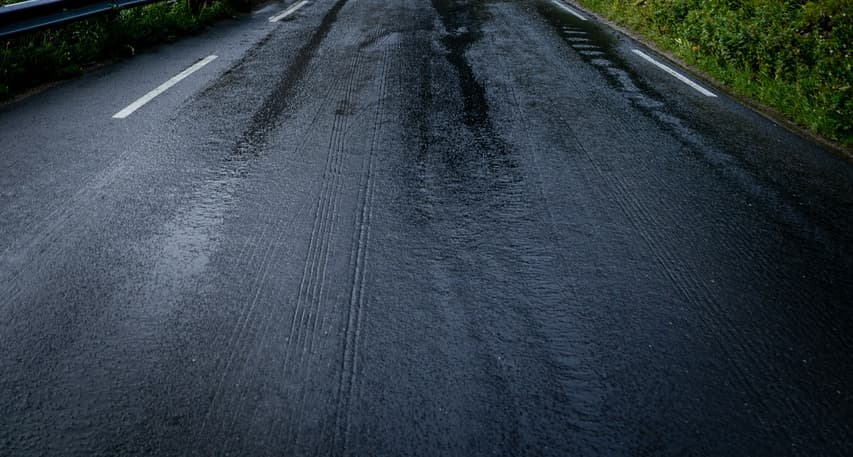What Are The Main Causes of UK Road Surface Damage?
July 04, 2024 Road Repairs, Road Maintenance, Road Surfacing 4 min read

The condition of road surfaces across the UK is a constant topic of concern for local councils, road users, and road surfacing companies. While roads are fundamental to our daily lives, several factors contribute to the deterioration of their surfaces. Understanding these causes can lead to more effective road resurfacing and maintenance strategies. Below, we look into major factors responsible for road surface damage in the UK.
Weather Conditions
UK weather presents several challenges for road surfaces. The freeze-thaw cycle during the winter months is particularly damaging. Water enters small cracks in the road surface, and when temperatures drop, this water freezes and expands, causing the cracks to widen and deepen. This process repeats throughout the winter, progressively worsening the road’s condition. Additionally, heavy rainfall can lead to surface water pooling, which not only poses a risk for hydroplaning but also accelerates the road surface’s degradation due to water infiltration.

Wet Road
Heavy Traffic
The volume and weight of traffic significantly impact the longevity of road surfaces. Heavy vehicles, such as trucks, exert far more pressure than cars, leading to quicker road surface wear and tear. In areas with high traffic volumes, such as major motorways and city centres, the frequency of road resurfacing might need to be higher to maintain a safe and smooth driving surface. Repeated stress and strain from vehicles cause the materials to weaken, eventually leading to the formation of ruts, potholes, and other surface irregularities.
Ground Movement
Ground movement, though less frequent, can have significant effects on road surfaces. Natural events or even regular soil settlement can cause shifts in the roadbed, leading to cracking and uneven surfaces. This ground movement can create dangerous driving conditions and often requires immediate attention from road surfacing companies to prevent further damage.
Oxidation
Oxidation is one of the leading causes of road surface degradation. This process involves the chemical reaction between oxygen and the bitumen binder within the asphalt. Over time, exposure to sunlight and air causes the bitumen to harden and become brittle. This results in the formation of cracks on the road surface. These cracks can then allow water to penetrate the surface, exacerbating the deterioration process.
Construction Quality and Materials
The durability of road surfaces is also heavily influenced by the quality of construction and the materials used. Poorly mixed asphalt, inadequate compaction, and use of substandard materials can all lead to premature road surface failure. Ensuring that roads are constructed using high-quality materials and proper techniques is crucial for their longevity. This underscores the importance of employing reputable road surfacing companies to carry out public road surfacing projects.
Tree Roots and Vegetation
Vegetation, particularly trees with extensive root systems, can cause significant damage to road surfaces. Roots can grow beneath the road, causing the surface to lift and crack. This not only creates an uneven driving surface but also makes the road more susceptible to water damage. Road managers often need to strike a balance between maintaining roadside greenery and protecting the integrity of road surfaces.

Tree roots can damage road surfaces
De-icing Chemicals
While essential for maintaining road safety during icy conditions, de-icing chemicals can contribute to road surface deterioration. Salt and other de-icing agents can corrode the asphalt, leading to the breakdown of the road surface over time. The cumulative effect of winter maintenance practices needs to be considered when planning road resurfacing schedules and techniques.
Effective Maintenance and Resurfacing Solutions
To mitigate these damaging factors, strategic road resurfacing and maintenance are vital. Road surfacing companies play a crucial role in ensuring roads remain safe and durable. Some effective strategies include:
- Regular Inspections and Preventive Maintenance: Routine inspections can help identify early signs of damage, allowing for timely interventions before the problems escalate.
- Use of High-Quality Materials: Employing durable materials that can withstand the elements and heavy traffic can extend the life of road surfaces.
- Advanced Resurfacing Techniques: Modern resurfacing techniques, such as microsurfacing or hot-in-place recycling, can provide longer-lasting solutions compared to traditional methods.
- Enhanced Drainage Systems: Improving drainage around roads can prevent water pooling and reduce the freeze-thaw cycle’s impact.
In summary, the major causes of road surface damage in the UK include oxidation, traffic loads, weather conditions, ground movement, construction quality, tree roots, and the use of de-icing chemicals. Addressing these issues with effective maintenance and resurfacing practices is essential for maintaining the country’s transport infrastructure. Collaboration between road managers and road surfacing companies will ensure the longevity and safety of public road surfacing projects.
Get your free surfacing quote
Let our team of experts handle your surfacing — get a free quote today.